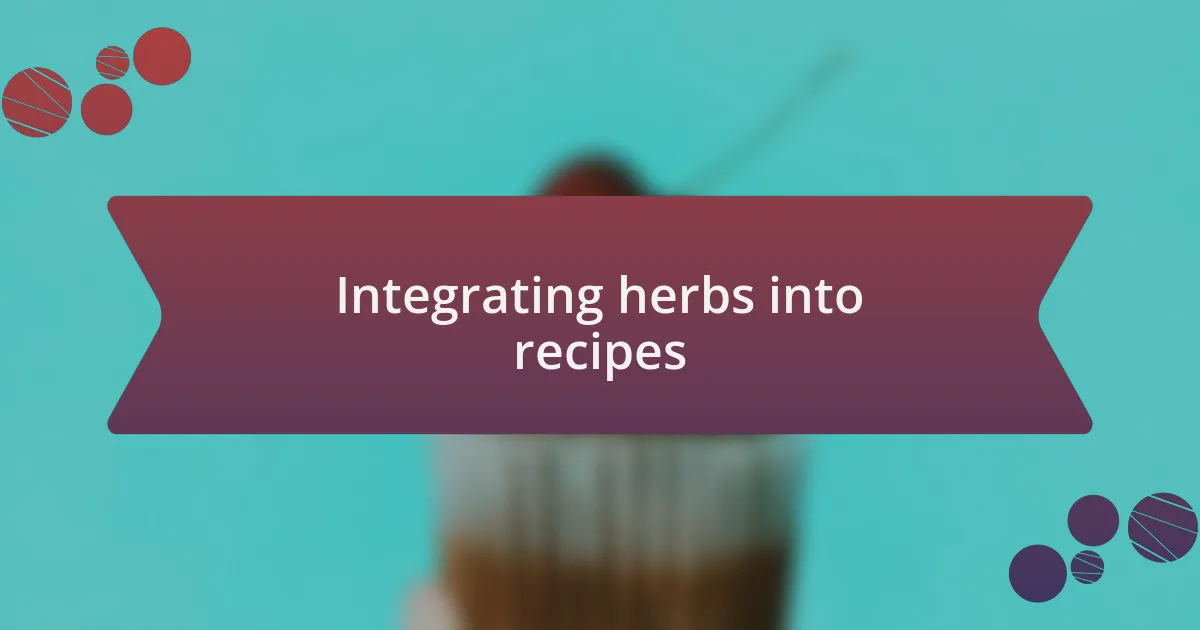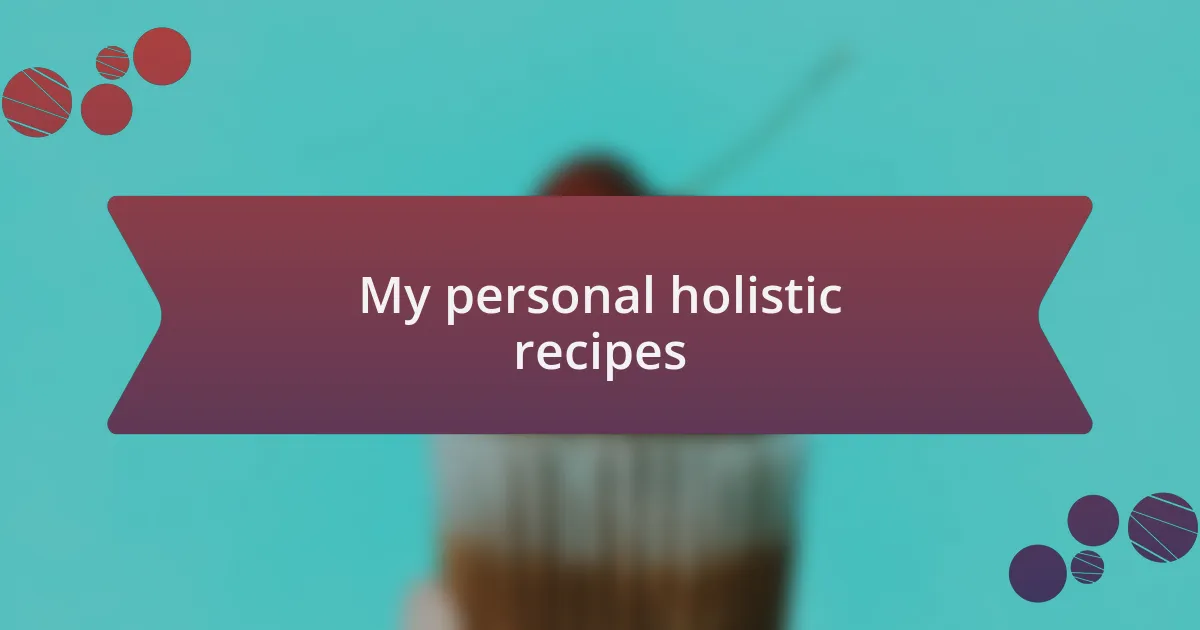Key takeaways:
- Holistic remedies promote overall well-being by treating the mind, body, and spirit, leading to personal empowerment and enhanced emotional health.
- Cooking with holistic ingredients, such as fresh herbs and seasonal produce, nourishes both the body and soul, fostering a deeper connection to food.
- Integrating herbs into meals transforms flavors and evokes memories, highlighting the emotional impact of cooking and food experiences.
- Maintaining a holistic journal and starting with small changes can help individuals effectively incorporate holistic remedies into their daily routines.

Understanding holistic remedies
Holistic remedies focus on treating the whole person—mind, body, and spirit—rather than just addressing specific symptoms. I’ve found that incorporating elements like herbal teas or essential oils into my daily routine can create a sense of balance that I sometimes struggle to find in our fast-paced world. Doesn’t it feel refreshing to take a moment for self-care?
When I first tried aromatherapy, I was skeptical. I remember being hesitant to believe that just inhaling the scent of lavender could ease my stress after a long day. But I was genuinely surprised by how much calmer I felt; it made me realize that sometimes the simplest solutions can have profound effects on our well-being.
Exploring different holistic remedies has been a journey of self-discovery for me. There’s a certain empowerment that comes from understanding how natural solutions can enhance our health. Have you ever noticed how a warm cup of chamomile tea can cradle you in comfort? It’s these small, meaningful practices that weave together the fabric of a holistic lifestyle.

Benefits of holistic remedies
The benefits of holistic remedies are vast and often intertwined with our everyday experiences. I remember a time when I faced persistent headaches that didn’t seem to respond to conventional medication. By simply incorporating guided meditation and some gentle yoga into my routine, I found not only relief but also a newfound clarity that transformed how I approached stress. Have you ever noticed how a deeper connection with your body can lead to lasting wellness?
Another key advantage of holistic remedies is their potential to enhance emotional health. For me, creating a ritual around using calming essential oils has turned into an essential part of my night routine. The act of winding down with scents like bergamot or frankincense doesn’t just help me relax; it fosters a deeper emotional connection and cultivates a peaceful mindset. Isn’t it fascinating how a simple aromatic experience can shift our whole perspective?
Moreover, embracing holistic practices encourages a proactive approach to health. When I consciously choose to prepare meals with nutrient-rich ingredients, such as fresh herbs and vibrant vegetables, I feel more energized and engaged in my daily life. This focus on nourishment goes beyond physical health—it empowers me to take charge of my well-being, influencing my mood and outlook. How often do we overlook the impact of what we consume on our overall happiness?

Cooking with holistic ingredients
Cooking with holistic ingredients not only nourishes the body but also nurtures the soul. I vividly remember a weekend when I decided to experiment with a new recipe featuring quinoa, kale, and turmeric. The bright colors of the ingredients energized me as I chopped and sautéed, and with every bite, I felt a profound connection to my food. How often do we savor our meals in a way that truly respects their origin?
Incorporating herbs into my cooking has transformed my approach to meals. I’ve turned to fresh basil and mint, which don’t just add flavor but also bring a sense of joy to my kitchen. When I sprinkle a handful of these vibrant greens onto pasta or salads, I can’t help but smile, reflecting on how they embody the essence of nature. Isn’t it amazing how a handful of herbs can elevate not only a dish but also our emotional state while cooking?
I’ve also learned the importance of seasonal ingredients in my culinary journey. Recently, I embraced a farm-to-table philosophy, experimenting with local produce in my weekly meal prep. The flavor of ripe, juicy tomatoes in summer or the warm, earthy taste of root vegetables in fall reminds me that food connects us to the cycles of nature. Have you ever stopped to think about how the seasons influence not just what we eat but how we feel while cooking and enjoying those meals?

Integrating herbs into recipes
Integrating herbs into recipes can be a delightful adventure. I still remember the first time I added fresh rosemary to a roasted chicken dish. The aroma filled my kitchen, instantly transporting me to a rustic Italian farmhouse. That experience made me realize how herbs can create a sensory bridge to different cultures. Have you ever noticed how just one herb can take a familiar dish and turn it into something exotic?
When I cook with dried herbs, I often find myself reminiscing about my grandmother’s kitchen. She had a special jar for oregano, and as I measure it out, I feel a warmth and connection to her legacy. It’s fascinating how such small additions can evoke strong emotions and memories. What about you? Do you have a particular herb that brings back fond memories or transforms your mood?
Sometimes, I experiment by layering different herbs to create depth in my flavors. For instance, mixing dill with lemon zest in a creamy dressing added a refreshing twist to my favorite potato salad. It was a simple change, yet it opened my eyes to the potential of culinary creativity. Have you ever thought about how a few fresh herbs can surprise your palate and inspire new dishes?

My personal holistic recipes
One of my favorite holistic recipes is a soothing ginger tea that I turn to whenever I feel under the weather. I simply slice fresh ginger and steep it in hot water, adding a splash of lemon and a drizzle of honey. It’s not just a drink; it transforms my mood and warms me from the inside out. Have you tried making a tea that comforts you during those chilly days?
Another holistic remedy I cherish is my herbal-infused medicinal honey. I infuse honey with lavender and chamomile, and I love using it in my recipes, especially in baked goods. Each spoonful carries a bit of tranquility, and I can’t help but feel calmed as I stir it into my morning oatmeal. Can you think of a recipe where a touch of sweetness has made a difference in your day?
I also enjoy experimenting with a homemade turmeric paste which I incorporate into various dishes. By combining turmeric, black pepper, and coconut oil, I create a vibrant addition to soups and curries. The golden hue not only brightens the meal but also sparks conversation about the healing properties of turmeric. Isn’t it amazing how one ingredient can lead to both flavor and a deeper understanding of wellness?

Tips for using holistic remedies
When I first started using holistic remedies, one tip that truly helped was to always listen to my body. Everyone’s needs are different, and what works for someone else might not resonate with you. Take note of how you feel after trying a specific remedy; your instincts often guide you toward what’s most beneficial.
Another helpful practice is to keep a holistic journal. I found that documenting my experiences not only helps me track what remedies are effective but also allows me to reflect on my emotional journey. Have you ever looked back at your notes and discovered patterns that reveal more about your wellness journey?
Incorporating holistic remedies into daily routines can be transformative, but I advise starting small. For example, I began by adding one new practice each week, like using essential oils in my bath or sipping herbal teas. This gradual approach prevented overwhelm and made the benefits feel more integrated into my life. What small change are you ready to explore this week?

Results from my holistic cooking
I was pleasantly surprised by how my holistic cooking methods elevated my overall well-being. After incorporating more fresh herbs and spices into my meals, I noticed an increase in my energy levels and mood. Have you ever felt a boost just from the aroma of rosemary or turmeric? It’s fascinating how these simple ingredients can have such profound effects.
One particularly memorable experience was when I prepared a ginger-infused soup during a cold winter week. Not only did it warm me up physically, but it also comforted me emotionally. I’ve come to appreciate how certain flavors can evoke feelings of nostalgia and calm, reminding me of family meals shared during my childhood. Isn’t it remarkable how food can connect us to our past while also nurturing our bodies?
I also observed that my digestive issues started to improve after I embraced more plant-based dishes. Swapping out processed foods for wholesome ingredients made a significant difference in how my body responded. What changes can you implement in your meal planning that might lead to such rewarding results?